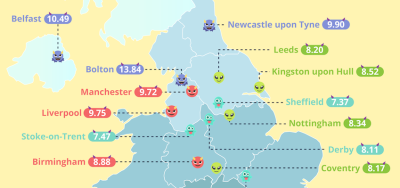Brand flies flag for addicts

Russell Brand, the alternative comedian known for his quasi-intellectual quips on almost every subject known to man, is to offer his thoughts once again on 8 May – when he addresses a group of Methodists in the north east and tells them how former addicts can boost their churches.
In recent years, the comic has been on a spiritual drive, which has taken him away from our television screens and forced him to confront some of his inner demons. This has included attending a 12-Steps course specifically aimed at aiding people suffering from drug, alcohol and substance addictions.
In Brand’s case, the programme has proven to be very successful. And he believes the 12-Steps programme, and former addicts who have been put through their paces on the recovery course, can be a significant and positive influence on church life, if they are given an opportunity to do so.
‘It has given me purpose, freed me from trauma and shame,’ he wrote in his recent biography Recovery: freedom from our addictions.
‘It has given me the sanctuary that I sought from each false prophet that briefly illuminated, then stained, my using life. It has shown me that sex, drugs, fame and money are no more likely to resolve the yearning I’ve always felt than porn or biscuits.
‘If you feel that yearning and that you’ve never quite fitted into this world then you should give yourself and this programme a chance because the yearning is real, its trying to lead you home.’
The What the Church can learn from addicts event is being held online (on Zoom) and will last five hours. It costs £5 to participate.
As well as Brand, it will feature a number of Methodist speakers who will share their stories about seeing addicts being cured. Several former addicts will also share their vivid experiences.
To find out more about the event and book a ticket, please click here.

Hope lives

There’s a verse in the Bible that says if Christ has not been raised, then our faith is a complete and utter waste of time.
I love this statement as it sums up what I think far better than I ever could.
Some sceptics have suggested someone stole the body of Jesus, others say people hallucinated. But we’re told that Jesus appeared to 550 people, once to 500 in one go. From what I know, hallucinations don’t work like that.
And as for the stolen body, who would do such a thing? Certainly not the Jews or Romans. Within a matter of weeks all of Jerusalem was awash with rumours that Jesus had come back to life, yet no-one admitted to it or produced the body to end the rumours once and for all.
The disciples certainly wouldn’t have moved the body; they were terrified and hiding outside the city. How did they get past the well-trained Roman guards – men who would have been put to death for losing a living prisoner, let alone a dead one?
And why would the disciples lie? They proclaimed the resurrection truth for a further 40 years, never once denying it. Every one was beaten, tortured, stoned and put in prison. Many went on to die horrible deaths for their belief that Jesus had come back to life. Why do this if it was all a lie?
Transformed his life
Many years ago, the American journalist, Frank Morrison, started to write a book to prove that the resurrection never happened. After considerable research he realised that in actual fact, it did happen. As a result, he became a Christian. It was a realisation that transformed his life.
And it’s still transforming many lives today.
In the last 100 years, the number of Christians in the world has quadrupled – from about 600 million in 1910, to well past two billion presently.
Today, Christianity remains the world's largest faith group and it all hangs on this fact: that Jesus was raised from the dead that first Easter Sunday in April AD30.
It's the day when love wins and death dies, pain ends and hope arises.
It’s either the biggest load of rubbish you’ve ever heard or a life-changing truth. The choice is yours.

Much more than a story

The world has become so familiar with the story of Jesus’ crucifixion and resurrection that we often fail to appreciate how disturbing, challenging and frightening these supernatural events must have been to those witnessing them in first century Israel.
For me, however, the Easter story is the most important of all the stories that flow out of the pages of the Bible. In simple terms, nothing compares.
Jesus agonised on the cross for six, long hours. During the first three-hour period darkness fell over the entire land before an earthquake shattered what little peace there was; tombs filled with corpses were broke open by the tremors; and the curtain wall of the great Temple was torn from top to bottom.
When he had died, Joseph of Arimathea, a member of the Sanhedrin and a secret follower, went to Pontius Pilate and requested Jesus’ body.
The Roman governor sought confirmation from a Centurion about Jesus’ fate. He was told a soldier had pierced the body of Jesus with a spear. The soldier also informed Pilate that Jesus was dead.
Joseph proceeded to take Jesus’ body, wrapped it in a clean linen shroud, and placed it in a tomb, using a large rock to seal the entrance. As a precaution, Roman guards were placed outside the tomb to ensure it was protected from Jesus’ followers, or robbers.
Changed our world
Despite these precautions, Jesus escaped from his hole in the ground the following Sunday, revealing himself to Mary Magdelene. And as the disciple Matthew writes: ‘He is not here; he has risen, just as he said…’
Scholars say there may be a very practical reason for the Resurrection to have happened in three days.
First-century tradition held that only after three days could you be sure someone was dead. After four days, the spirit was presumed to leave the body.
How interesting that Jesus chose to show himself to Mary, when culturally women were viewed as second-class citizens; how extraordinary that Christ chose to return to the disciples just after Thomas had infamously case his doubts; and how wonderful it is that he chose to show himself to two hitherto unknown disciples on the Emmaus Road.
That first Easter changed the world forever – and it’s little wonder, for this really is the greatest thing to ever happen in our world.
Two thousand years later, we are still trying to comprehend its meaning and relevance. All I can say to that is: ‘He's alive and He has risen. Hallelujah.’

Charity has big UK impact

A ‘Good Samaritan’ organisation is having a major impact on gun, knife and drug crime in 80 British towns and cities – and, over the next few months, it is set to boost ‘kindness’ and community cohesion in a further 180.
Redeeming Our Communities (ROC UK) brings together community groups, food banks and scout groups from across the country, and links them with like-minded senior leaders from schools, councils, business, voluntary agencies, churches, the emergency services and the NHS.
It then organises local programmes that seek to work in holistic ways that benefit people who are experiencing significant life challenges. This can include crime, family breakdown, loneliness and mental health issues.
And it is now about to triple its reach and extraordinary impact.
‘We have seen a quite extraordinary leap in demand for our programmes since COVID-19, commented Debra Green, who founded the Manchester-based organisation in 2004.
‘We have spent 17 years helping towns and cities across Britain, with excellent results. Now demand is exploding.
‘The formula works, and with all the huge challenges of the coronavirus hitting home, we are finding that areas are increasingly desperate to have what we are offering.’
For more information on ROC UK, please call 0161 393 4511 or send an email to info@roc.uk.com
Inspired by a thief

There is one character within the Easter story I find more fascinating than any other – with the exception of Christ himself.
Like so many, this man showed faithfulness and humility. Yet his name is unknown to the world.
That seems to be the way of things in the Bible – heroes without names during a time and place very unlike the modern world of today, where everybody has to be a ‘face’!
If you haven’t guessed already, I am talking about the thief on the cross; the wretch who was crucified alongside Jesus, and despite the pain and suffering he endured still recognised Him as the Son of God.
In fact, on Good Friday, the thief appears to know more about Jesus than his disciples, understanding very clearly that he was about to be granted entry to The Kingdom, with all that entails.
Quite how the thief recognised and knew Jesus' reasons for being on the cross are one of the most wonderful mysteries to be found in scripture.
As someone who has a thirst for knowledge, I find myself eager to know how, in the short time they were acquainted, this man became so aware of Christ and his mission, and how he realised that by acknowledging who He was, and repenting, he was assured of gaining entry to a heavenly realm?
While the Bible has many unanswered questions, this is one of several I'd love to know more about.

Top ‘prank’ city revealed

April Fool’s Day has arrived – and the Sorted team hopes you have taken all the japes, jokes and shenanigans in good humour?
The clever people at OnBuy.com also enjoy a good laugh, so much so that this time round they got their researchers to find out which city boasts the greatest number of pranksters.
By analysing Google search volumes from the past three years for a variety of keywords related to pranks, it can be revealed Bolton is the UK’s 'prank capital'. Apparently, the equivalent of 13.84 joke and pranks searches are made by every 1,000 residents on April Fool’s Day.
Not far behind are the Scots, who have always been known for their great sense of humour. It seems the land that gave us William Wallace, Robert the Bruce and The Krankies also enjoys a good joke on 1 April – with Glaswegians the UK’s second biggest pranksters in the UK (with a 10.95 search rating).
The Northern Irish are also active participants in mischief and mayhem, easily making the top three.
Fake snake pranks
When it comes to particular types of pranks, some cities have very distinct favourites.
For example, the people of Reading are most likely to be fooled by their colleagues, while relatives and boyfriends can expect to receive a host of food-related pranks.
Fake dog poo and Facebook jokes are the top ways people from Bournemouth have a laugh at the expense of their friends.
Meanwhile, if you fear snakes, it better not to be in Aberdeen, for the city has the highest search volumes for fake snake pranks in the UK on April Fool’s. Boyfriends are also at serious risk – and it seems anyone could fall foul of creative pranksters from the city who get a real kick out of an array toilet paper pranks. As to what they might be, we will leave it to you imagination.
Rare bird excites ‘twitchers’

The Trossachs is a part of Scotland noted for its wooded glens, braes, and lochs lying to the east of Ben Lomond. It’s an area of natural beauty that paves the way to the Highlands.
Outside of lockdown, tourists from all over the world flock to the area. And it’s little wonder why, such is the magic of this Scottish idyl.
In recent weeks, birdwatchers have been inundating the Scottish Tourist Board and hotels in the area, seeking to book accommodation in picturesque places like Balloch, Callander and Doune.
The source of the surge in interest is a result of the rarest of British birds – the Ardlui Humming Bird – being spotted in the area.
‘There have been a number of sightings in recent days that has got the bird watching community particularly excited,’ commented spokesman Olli Farop. ‘It is a beautiful bird, one of the rarest. So it’s little wonder there is such excitement.
‘Now we are coming out of lockdown, we are hopeful the influx of people from all over the world will be a real shot in the arm for the country – albeit they only have a fleeting moment to see it before it retires to raise its brood of youngsters.’
Tender voice
Known as the Kinlochkilkerran until the start of the 19th century, there are less than 20 known breeding pairs of the Ardlui Humming Bird in existence. According to folklore they are less numerous than the Goldcrest and have a voice more tender than that of a Nightingale.
Archie McTaggart, an amateur birdwatcher from Fort William, has been lucky to see and hear the bird on three occasions.
‘Och, I was a wee laddie when I first heard its wondrous melodies,’ the 72-year-old told Sorted. ‘I also managed to see it for a fleeting moment, but didn’t appreciate just what I was hearing and witnessing.
‘It was only in later years I realised how lucky I had been. As a result, I became a bird watcher, and I have been blessed to see the bird on two further occasions. I am hoping this year, I will see it one more time.’
To stand a chance of seeing the Ardlui Humming Bird, you had better be quick about it. Its breeding season finishes on 4 April.
Coping with lockdown stress

With more and more people seeking help to combat post-lockdown anxiety, a leading psychotherapist is offering some valuable and timely advice.
Keeley Taverner, whose Key for Change practice is based in Uxbridge and London, believes being realistic about the coming months is vital as is acknowledging that life has been challenging over the last 12 months.
‘Feelings of anxiety around lockdown restrictions beginning to ease are not anything to fear,’ she says. ‘In fact, they’re only natural.
‘What we do have to remember though is that we’ve been here before. When restrictions eased last summer, we went through the process of reintegrating and got back to some kind of normality, even if it was short-lived.
‘It’s key for people to remember to approach situations with optimistic caution, not to be afraid of feeling anxious and to accept that life has been challenging over last 12 months.”
Here are her top tips to Sorted readers for dealing with the post-lockdown blues:
Optimistic caution
For people who like to plan and have order, a lockdown date shifting by just a few weeks could be detrimental. Make tentative plans but nothing too concrete.
Anxiety and fear
Think about the signs that show your fears are beginning to take over. Are you dropping the ball with your finances, health or well-being? These are the things to look out for and to seek help with.
Fear of future lockdowns
Rule-breakers cause frustration and anxiety. So think about whether your anger or rage is down to the actions of a minority, or whether there’s a more deep-rooted problem?
Acceptance
Acknowledging that life is challenging right now can empower us to look at what we can do to feel better, however small that may be.
Accountability
As restrictions begin to ease, set yourself small goals and be accountable for them. So, arrange to meet a friend for a walk, another for a coffee. Taking mall steps can really help.
Be realistic
There is no cure for Covid19. Vaccines are going well but there will be new strains and people will still get sick with the virus. Accepting this helps.
Opportunities
The last year has undoubtedly tough, but there have also been lots of positives and opportunities and this is what we need to focus on as we come out of lockdown. They don’t have to be big things, they can simply be about spending more time together as a family, meals as a family unit everyday and having time to sit down and communicate. Some of these we will want to take into our post-lockdown lives.
Charity delivers African jabs

While 50 per cent of adults in Britain may have now received their COVID-19 jabs, we should spare a thought for the billions of people around the world who are less fortunate – including many who live and work in remote and hard-to-reach places.
One organisation committed to supporting these hard to reach people is the team from the Mission Aviation Fellowship, a UK-based charity in Folkestone.
Since 21 March, MAF planes and pilots have been delivering jabs to rural healthcare workers based at remote mountainside clinics in the African state of Lesotho.
So far, MAF’s efforts have resulted in more than 200 healthcare staff being vaccinated, enabling communities in Kuebunyane, Labakeng and Matsaile to continue receiving essential support.
‘Reaching these locations by road is just too difficult,’ said MAF pilot, Grant Strugnell. ‘We are the only air service to connect these remote regions to vital medical supplies. It’s really good news these rural healthworkers were included in this round of vaccination.’
Vaughan Woodward, the charity’s International Development Manager, added: ‘While the demand for COVID-19 vaccines continues to exceed supply in the most vulnerable countries, MAF teams are doing everything they can to provide global, last-mile delivery of vaccines as quickly and safely as possible to ensure equitable access for the most isolated communities.”
Lesotho’s rural vaccine rollout is using the vaccine produced by AstraZeneca.
If you wish to find out more about MAF and its work, please click here.

Poirot actor’s Bible world-first


